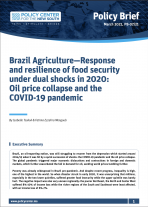Brazil Agriculture—Response and resilience of food security under dual shocks in 2020: Oil price collapse and the COVID-19 pandemic
Brazil, an oil-exporting nation, was still struggling to recover from the depression which started around 2014/15 when it was hit by a quick succession of shocks: the COVID-19 pandemic and the oil price collapse. The global pandemic triggered major economic dislocations and contractions in foreign and domestic markets, which further exacerbated the fall in demand for oil, sending world prices tumbling further. Poverty was already widespread in Brazil pre-pandemic. And despite recent progress, inequality is high, one of the highest in the world. So when disaster struck in early 2020, it was unsurprising that millions, especially in the two lower quintiles, suffered greater food insecurity while the upper quintile was barely hurt. The negative impact was also very uneven regionally: the poorer Northeast, the North and Center West suffered 8%-10% of income loss while the richer regions of the South and Southeast were least affected, with an income loss of 6%-7%. Fortunately, the difficult recession and pandemic period was preceded by a decade or so—2002-14—of GDP growth and reduced income inequality. During this ‘Golden Period’, Brazil made substantial progress on reducing poverty and strengthening major programs of social transfers, in particular the Bolsa Escola and the Bolsa Familia programs, which invested in the human capital of poor children and young people. When the dual shocks struck in early 2020, these programs were scaled up to mitigate the adverse impact of increased unemployment and income loss. In addition to these social transfers to the poor and vulnerable, Brazil has other sources of resilience. First, Brazil has a relatively large formal-sector workforce, which can draw on unemployment insurance and personal savings. Second, it has near-universal access to pensions and/or social security for the older population which is more vulnerable to COVID-19. Third, it has developed a robust institutional infrastructure for the delivery of emergency measures, notably its beneficiary registry, the Cadastro Unico, which has enabled the government to expand social transfers and emergency aid to the poor, who are mainly those working in the informal sector with unprotected jobs. Brazil’s resilience largely rests on three institutional pillars: (i) unemployment insurance for formal labor, the bulk of the workforce; (ii) pensions for the older population; and (iii) the Cadastro Unico for the poor who typically succeed in having only informal jobs.










